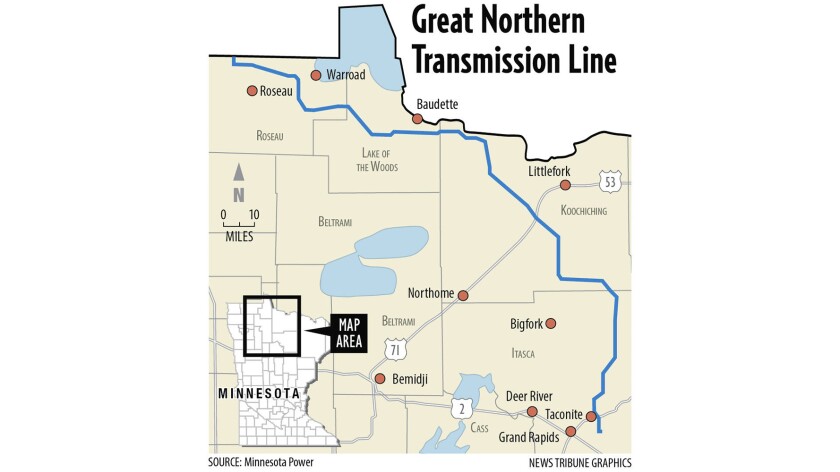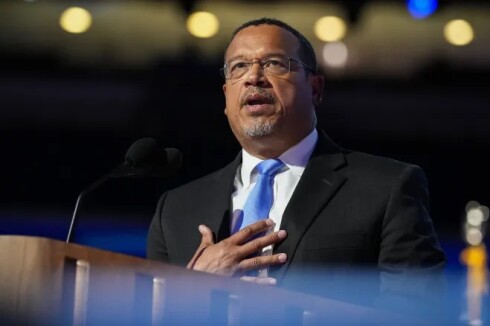DULUTH — If Republican President Donald Trump’s tariffs on oil and electricity imports from Canada are enacted next month, customers in the Northland could see energy prices increase.
Tariffs of 10% on Canadian energy like oil, natural gas and electricity — smaller than the 25% tariffs on all other goods from Canada — were set to take effect Tuesday but were delayed for at least a month late Monday.
ADVERTISEMENT
While companies importing goods from abroad pay tariffs to the government that enacts the tariff, economists agree that those costs are generally passed on to consumers, causing prices to increase. Trump, who, during the campaign, insisted he would lower prices and inflation, acknowledged Sunday that tariffs could cause Americans “pain” in the short term, Reuters reported.
Ahead of the 30-day delay, Patrick De Haan, head of petroleum analysis at GasBuddy, which tracks gas prices, told the News Tribune he expects the tariffs are a “negotiation tactic” by the Trump administration.
But if they take effect, they could account for a 5- to 20-cent increase in a gallon of gas, he said.
He added that the exact impact of tariffs on gas prices will likely be muddied by the annual spring price increase thanks to the expected increase in demand, scheduled refinery maintenance and switch to summer blends of gasoline, which would cause prices to increase 20-60 cents.
“The tariffs will probably be a small impact to people’s wallets, almost negligible over the next few weeks unless something changes,” De Haan said. “I think what is more significant is the seasonal lift of prices that we see year in and year out.”
De Haan said that gas prices in the Midwest and Great Lakes regions of the U.S. would be most affected. That’s because the supply chain here is designed to process thick Canadian crude oil from Alberta’s tar sands.
“There was a business opportunity decades and decades ago,” he said. “Canada was basically selling their tar sands to us at a very big discount, so we started building infrastructure, pipelines, refineries that were able to take advantage of the situation to produce fuel that we needed.”
ADVERTISEMENT
An explainer by the American Fuel and Petrochemical Manufacturers, an oil and gas trade association, said that refineries designed to process heavy crude oil from Canada and Mexico can’t just switch over and handle light oil from the Bakken in Montana and North Dakota or the Permian in Texas and New Mexico, and forcing them to process a different kind of oil “would cause them to reduce production and potentially shut down.”
“And while it sounds counterintuitive, simply drilling for more U.S. shale oil is not a viable substitute for much of what we import,” the organization said.
On Sunday, the organization’s CEO, Chet Thompson, said in a statement that he was “hopeful a resolution can be quickly reached with our North American neighbors so that crude oil, refined products and petrochemicals are removed from the tariff schedule before consumers feel the impact.”
Cenovus Energy, the Calgary-based owner of the refinery in Superior, said in an emailed statement to the News Tribune on Monday that tariffs will hurt economies and consumers in both the U.S. and Canada.
Instead of a trade war, we should be working to advance North America as an energy powerhouse.
While the company said it is not sure what proportion of the tariffs will affect producers, refineries and consumers, the tariffs could potentially mean higher prices for gasoline, diesel, aviation fuel and asphalt.
“Refiners, such as the Cenovus Superior Refinery, benefit from access to cheaper Canadian feedstock, as do many other refineries in the U.S. Midwest,” the company said. “Many analysts predict the tariffs will lead to an increase in the price of gasoline particularly in the Midwest.”
Enbridge, also based in Calgary, ferries Canadian crude oil into the U.S. via its network of pipelines across northern Minnesota, Wisconsin and Michigan. It said the U.S. and Canada have a "highly integrated energy system and markets” that benefit each other.
ADVERTISEMENT
“Instead of a trade war, we should be working to advance North America as an energy powerhouse,” Enbridge spokesperson Juli Kellner said in an emailed statement to the News Tribune. “For the sake of our customers and consumers, and industry on both sides of the border, we need to encourage a resolution.”
While Canadian natural gas would also be hit with a 10% levy, local utilities aren’t entirely reliant on Canada to source the fuel that many use to heat their homes and water.
The News Tribune reported in 2022 that Comfort Systems, Duluth’s city-owned local water and gas utility, gets natural gas from two sources: Northern Natural Gas, which owns a pipeline system that begins in Texas and ends in northern Minnesota, Wisconsin and the Upper Peninsula of Michigan, and TC Energy’s Great Lakes Transmission System, which carries natural gas from Canada into the region.
It also has preexisting long-term contracts and often has purchased gas already in storage, which can cushion cost increases, but when prices jump outside of its control, as they had in 2022, Comfort Systems said that it passes those costs on to customers, the News Tribune reported at the time.
“The City is monitoring the evolving discussion on tariffs, but we won’t be able to comment at this time on any potential impacts to our natural gas supply,” Jim Benning, director of public works and utilities at the city of Duluth, said Monday in an emailed statement to the News Tribune.
Electricity
Oil and gas are not the only types of energy flowing from Canada into the U.S. Electricity produced in Canada takes transmission lines into Minnesota.
Minnesota Power is nearly five years into a 15-year power purchase agreement with Manitoba Hydro, bringing 250 megawatts of hydropower from northern Manitoba to Minnesota Power customers.
ADVERTISEMENT

Asked how the 10% tariff on electricity from Canada will affect Minnesota Power and whether it would increase customers’ electricity rates, Minnesota Power spokesperson Amy Rutledge said in an email, “Given the breadth of the executive orders, we are still evaluating the tariffs and impact. Our number one commitment is the safety, security and reliability of our electric system and we’ll continue to work on behalf of our customers to navigate these new executive orders and their implications.”
Minnesota Power built a 224-mile, 500-kilovolt transmission line from a substation east of Grand Rapids to the international border in Roseau County to carry the hydropower. The Duluth-based utility can also send power northward when wind production is high.
Energizing the line in 2020 was key in helping the company jump from 30% renewable energy to 50% renewable energy.













